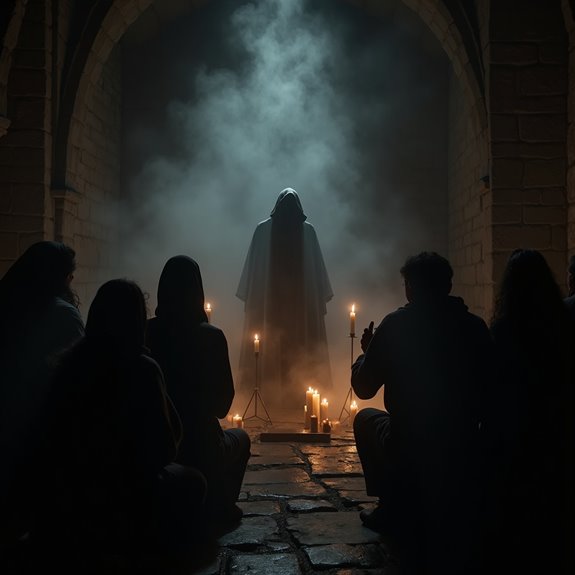Do Exorcisms Really Work?
Exorcisms have sparked debate for centuries, with believers citing transformative experiences and skeptics attributing outcomes to psychological factors. While some individuals report profound relief and restoration during these rituals, others question whether these effects stem from faith or community support. As stories of notable cases surface, the complexity of this ancient practice demands a closer look at its implications for mental health and spiritual well-being. What’s the truth behind these enigmatic rituals?
Introduction

What drives people to seek out exorcisms? Individuals often turn to exorcisms in desperate times, believing they or their loved ones are afflicted by malevolent forces. These direct experiences—such as sudden changes in behavior, unexplained phenomena, or feelings of oppression—can leave one feeling powerless. Often, personal and cultural beliefs strongly influence this decision. In many communities, exorcisms are seen as a legitimate response to spiritual distress. The fear of the unknown compels people to look for solutions outside of traditional therapy or medicine, hoping for relief through faith and ritual. For some, it’s a reclaiming of control over their lives. Ultimately, the appeal lies in the promise of liberation from suffering and the restoration of peace.
Ancient Practices in Sumeria

Ancient Sumerians practiced rituals that aimed to rid individuals of evil spirits, reflecting a deep belief in the supernatural’s influence on daily life. They believed that spiritual afflictions could cause various misfortunes, affecting health and prosperity. Priests, known as exorcists, led these ceremonies, using incantations, offerings, and specific prayers to invoke divine protection. Sacred texts often described these rituals, outlining their structure and purpose. They would also employ amulets and talismans, believed to ward off malevolent forces. The Sumerians understood the connection between mental health and spiritual well-being, recognizing that torment from supposed demons could manifest in emotional distress. These ancient practices set foundational beliefs about exorcism, influencing later cultures in their approach to spiritual healing.
Notable Cases or Sightings

Throughout history, there have been numerous accounts of exorcisms that have captivated public interest and sparked debate about their effectiveness. One of the most famous cases involves a young boy known as “Roland Doe,” who underwent a series of exorcisms in the 1940s, inspiring the film “The Exorcist.” Another well-documented case is that of Anneliese Michel, a German woman who experienced severe mental health issues and tragically died after multiple exorcisms in the 1970s. More recently, reports from Catholic priests describe cases in the 21st century where individuals displayed unusual behaviors believed to indicate demonic possession. These incidents fuel ongoing discussions about the reality of exorcisms and their potential impact, leaving many questioning the line between mental illness and spiritual affliction.
Common Theories or Explanations
Many people have proposed various theories to explain the phenomenon of exorcisms and the beliefs surrounding them. Some argue that psychological factors play a significant role, suggesting that individuals experiencing distress may unconsciously manifest symptoms resembling possession. Others propose a social construction perspective, where the act of exorcism acts as a community ritual, providing relief through collective belief and support. Additionally, some believe that spiritual or supernatural elements are undeniably involved, attributing healing to divine intervention or energy shifts. Finally, skeptics point to the placebo effect, asserting that the mere act of believing in an exorcism’s power can lead to psychological improvement. Each theory offers a unique lens through which to examine the complex interplay of mind, belief, and perceived spiritual forces.
Frequently Asked Questions
Are Exorcisms Recognized by Mainstream Medical Professionals?
Mainstream medical professionals generally don’t recognize exorcisms as legitimate treatments. They emphasize mental health evaluations and evidence-based therapies instead, seeing exorcisms more as cultural or religious practices rather than solutions for medical or psychological conditions.
How Do Different Religions Approach Exorcisms?
Different religions approach exorcisms in unique ways. For instance, Catholicism emphasizes ritual prayers, while Hindu practices incorporate mantras and offerings. Across faiths, exorcism methods reflect beliefs about spiritual possession and healing influences.
What Psychological Effects Can Exorcisms Have on Individuals?
Exorcisms can create significant psychological effects on individuals. They might experience heightened relief, renewed faith, or even exacerbated anxiety and trauma, depending on personal beliefs and the surrounding circumstances during the ritual, influencing their mental state profoundly.
Are There Laws Regulating Exorcisms?
Laws regulating exorcisms vary widely, depending on the jurisdiction. In some areas, they’re considered religious practices without legal restrictions, while others may impose regulations to guarantee safety and prevent potential harm during these rituals.
What Qualifications Do Exorcists Typically Have?
Exorcists typically possess theological training, often within a religious institution. Many have experience in pastoral care or counseling, and some undergo additional spiritual formation or psychological training to effectively handle the complexities of their ministry.


